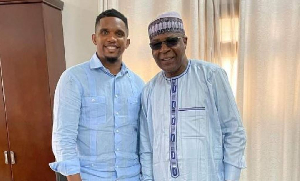Barrister Bernard Acho Muna has described human rights abuses in crisis-stricken Central African Republic, CAR, as gruesome.
The Chair of the UN International Commission for the Investigation of Human Rights Abuses and Violations in CAR has been in that country for a month. Muna, who was addressing the press in Yaounde recently, said he has pictures of gory human rights atrocities, with some depicting people strolling in the streets of Bangui wielding human heads as a sign of triumph.
He said his mission in CAR is a very difficult one given that almost all the institutions that incarnate the state like the police, the army, the gendarmerie and the courts, collapsed in the wake of the coup d’état that ousted former President Francois Bozize in 2013.
CAR has been a citadel of ethnic and sectarian violence since the Seleka rebels ousted Bozize. Muna said anarchy is the order of the day in CAR. It is in this light, he went on, that the transitional government led by the erstwhile Mayor of Bangui, Catherine Samba Panza, will have an uphill task re-establishing state institutions in an attempt to bring back order.
The lawyer said the CAR situation is already showing signs of genocide but expressed optimism that the UN Security Council is bent on stemming the tides because it recently resolved to send some 12,000 peace-keeping forces there.Muna equally expressed appreciation that the Africa Union forces, MISCA, have fought hard to bring the escalating violence under control.
Going by him, the CAR situation is a difficult one given that prisons were broken during the upsurge of the violence and all sorts of criminals emptied themselves into the streets. CAR, he went on, grapples with a situation wherein civil servants have not been paid for six months. It is a situation where the law of the survival of the fittest reigns. “There is religious violence wherein some religious structures are destroyed and the faithful ordered to leave. Some are killed in the most brutal manner,” Muna narrated.
Nonetheless, he said order was gradually being reestablished in the country. The violence triggered by the ex-Seleka and the anti-Balaka soldiers is being brought under control. The authorities are doing every bid to stem the tides of the propagation of hatred among various groups in the country.
The UN Secretary General, Ban-ki-Moon, appointed Barrister Muna to lead the three-man Commission in CAR. Other members of the Commission included the former Minister of Foreign Affairs of Mexico, Jorge Castaneda, and the international lawyer of Mauritanian origin, Barrister Fatimata M’Baye. Muna revealed that Caslanede withdrew from the commission recently and went back to his country. Thus, only the two of them are shouldering the enormous responsibility to investigate human rights abuses in CAR.
Observers hold that the former Mexican Minister’s withdrawal from the commission might have been because of the difficult nature of the assignment. Muna said movement in CAR is very difficult. Asked the calibre of people targeted for investigation, Barrister Muna said just everybody will be concerned.
To him, the rebels, the MISCA forces, French soldiers and other peace-keeping forces will be watched as far as human rights abuses are concerned. After living the situation and collecting facts for one month, Muna is expected to send a preliminary report to the UN Security Council on the CAR situation in June.
Diaspora News of Saturday, 26 April 2014
Source: cameroonpostline.com












